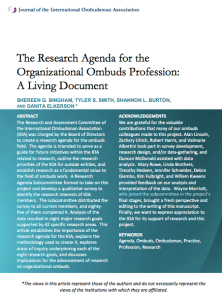Based on a directive from the IOA Board of Directors, the IOA Research Agenda Subcommittee, Shereen G. Bingham, Tyler S. Smith, Shannon L. Burton, and Danita Elkerson, have created a research agenda for the ombuds field.
The agenda is intended to serve as a guide for future initiatives within the IOA related to research, outline the research priorities of the IOA for outside entities, and establish research as a fundamental value to the field of ombuds work.
This article published in the JIOA establishes the importance of the research agenda for the IOA, explains the methodology used to create it, explores areas of inquiry underpinning each of the eight research goals, and discusses implications for the advancement of research on organizational ombuds.

